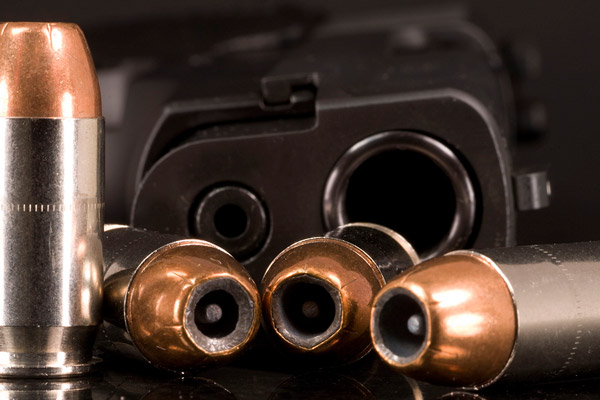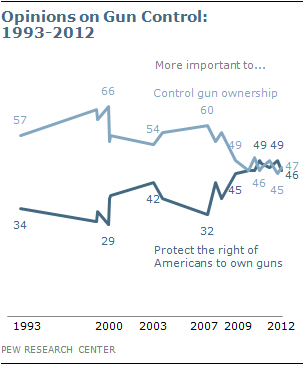
On Friday, the Pew Research Center published the results of its ongoing survey of gun control opinions in America; one thing in particular jumped out:

Support of gun control over gun rights increased from 1993-2000, then immediately dropped. There's another substantial decline from 2007-2009, but nothing like the shift before and after 2000. I thought about this when one of my colleagues, who did gun control work for what's now the Brady Campaign, gave a compelling explanation: the Democratic party looked at the electorate, feared the possibility of losing what was left of its white male voters (particularly in the Rust Belt and the South), and pulled the plug on gun control as a political issue. And, it's likely, completely misread the lay of the land.
In 2001, just after it happened, Noam Scheiber documented the disappearance of gun control as an issue for Democrats:
After a rash of school shootings, President Clinton was taunting the National Rifle Association ("I'm just trying to keep more people alive"), and Democrats had practically shut down Capitol Hill in a push for meaningful gun legislation. GOP aides worried that the issue would hurt them in November, and even Dick Armey groused that "it's not a good discussion." When Smith and Wesson announced it would accept a sweeping set of voluntary safety regulations, the Republicans' fear was palpable.
Yet talk to Democratic politicians about gun control these days and what's palpable is the silence. Not long after the election, The Washington Post reported that "several lawmakers suggested that party leaders may be better off playing down their support for gun-control legislation," a sentiment echoed two days later in The New York Times. Conservative Democrats like Marion Berry of Arkansas confide that "[Dick] Gephardt has said [the leadership] is not going to whip us on [gun control] anymore." And even a reliable liberal like Barney Frank advises that there's not "going to be a major push on this [issue]."
And the Gore campaign led the way:
As Stan Greenberg, Gore's pollster, tells it, the Gore camp took a hard look at the electoral map and reached an unavoidable conclusion. "The entire target of communication was Pennsylvania, western Ohio, Michigan, Wisconsin, Iowa. That's the world Gore was trying to reach;' Greenberg recalls. Since these areas were chock-full of gun-toting union members, Team Gore decided that gun control would hurt the vice president in the states he needed most.
Scheiber isn't the only political writer to note this. Alex Koppleman in Salon:
As Franklin Foer reported in the New Republic, “The hand-wringing began just as the Supreme Court awarded Florida’s electoral votes to George W. Bush.” Early in December, by Foer’s telling, then-House Minority Leader Dick Gephardt, D-Mo., summoned House Democrats to his Capitol office, 20 at a time, and gave a sales presentation. Pollster Mark Gersh pointed to charts and told the Democrats they’d lost because culture war issues, especially gun control, had distracted voters. Many apparently went away convinced.
[snip]
Terry McAuliffe, head of the Democratic National Committee [ed. note: and current Virginia gubernatorial candidate], in particular wanted his party to drop the issue. In a June 2001 article discussing McAuliffe’s strategy, Roger Simon cited a strong correlation between gun ownership and voting for Bush, as demonstrated by exit poll stats. “Guns made a big difference in 2000,” argued Simon, “especially in some key states that Al Gore lost, like Tennessee and Arkansas.” What Simon did not establish was how many of these gun owners considered gun control a paramount issue, or whether any of them would’ve chosen Gore over Bush if the vice president had moved further or earlier to the right.
Dorothy Samuels in the New York Times pushes the threat back a bit farther:
So I was reminded on a recent visit to Capitol Hill, when I asked several lawmakers and senior members of their staffs to explain the Democrats’ timidity about standing up to the National Rifle Association by pressing needed measures to curb gun violence.
[snip]
I was struck by a common thread in the responses I heard: Enactment of the original 1994 assault weapons ban cost Democrats control of Congress.
Samuels and Scheiber both challenge this wisdom, pointing out that Bill Clinton won re-election in 1996 while running on a gun-control platform, and in 2000 gun-rights advocates like Slade Gorton and Bob McCollum both lost to pro-control Democrats. Of course, these aren't great data points; people vote for politicians for lots of reasons. More specific and closer to the issue are state legislative initiatives which, my colleague argues, should have been cause for celebration among gun control advocates in 2000.
The lede to the New York Times's 2000 post-election ballot-initiative roundup is: "Among the winners: drug policy reform, gun control, all-English education. Among the losers: school vouchers, gay rights, sprawl containment." Gun control? Yup:
Colorado and Oregon easily passed ballot initiatives to require background checks of buyers even at gun shows, where federal law does not require such investigations. They passed despite heavy spending by gun advocates and amounted to a popular rebuke to legislatures that had rejected such measures.
In Colorado, where the massacre at Columbine High School left 15 dead last year, the measure passed 70 percent to 30 percent, spurred on in part by the parent of a Columbine victim. And in Oregon, where 15-year-old Kipland P. Kinkel went on a shooting rampage in 1998, killing his parents and two others, it passed 61 to 39 percent.
Oregon and Colorado have a reputation for thriving hippie/hipster liberal cultures, but Colorado is a purple state, and Oregon, like much of America, is only blue in its city centers; the rest of the state is red, in particular the conservative eastern part of the state, and it was a more conservative state in the late 1990s. They're not the Deep South, but the massive victories of ballot initiatives after two school shootings—against not just the NRA but state legislatures—were non-trivial victories.
Photograph: kcdsTM (CC by 2.0)



